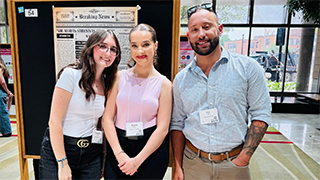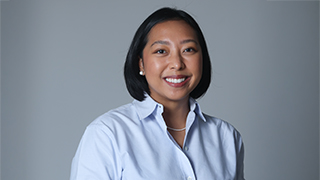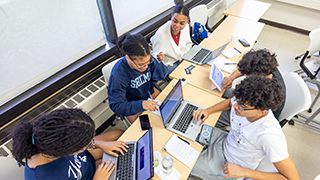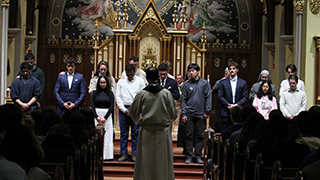Hands-On Microbiology Research Prepares Nursing Students for Global Health Challenges
Tuesday, September 9, 2025

Professor C.J. Urso and students
During the fall 2024 semester, Seton Hall University hosted its third annual Antibiotic Discovery Symposium, showcasing the work of nursing (B.S.N.) students engaged in original research on antibiotic-producing microbes. The goal of the project is to search for new sources of antibiotics at a time when many existing drugs are losing their effectiveness against resistant bacteria. By studying microbes found in local soil, students are contributing to the worldwide effort to discover novel compounds that could one day inform the development of new treatments.
Among the participating teams, nursing majors Hailey Murphy, Bianca Grund, Sophia Weathers and Samantha Schatz were recognized for the strength of their project. The team isolated a strain of Bacillus toyonensis that was able to inhibit the growth of several different kinds of bacteria. Their isolate showed activity against safe laboratory strains related to the “ESKAPE” pathogens, a group of microbes known for causing difficult-to-treat infections in hospitals. While preliminary, these results point toward the possibility of uncovering new antibiotic compounds from common environmental sources.
This past June, Weathers and Schatz traveled to the University of Wisconsin–Madison to share their team’s findings at the Tiny Earth Summer Symposium, which brought together nearly 50 student research groups from across the United States and abroad.
The team’s project originated at Seton Hall in BIOL 2141 Introduction to Microbiology, a required course for nursing majors that incorporates course-based research. Rather than following a standard laboratory manual, students in this course design and conduct their own experiments aimed at discovering new antibiotics in local soil samples. Their work contributes to a global effort to address antibiotic resistance.
Faculty mentor and visiting assistant professor C.J. Urso, Ph.D., explained that the course is structured to give students the opportunity to practice authentic science from the beginning of their studies: "Our students leave knowing they have contributed to real-world science. They’re not just learning about antibiotic resistance — they’re helping address it."
As part of Introduction to Microbiology, students isolate microorganisms from the environment, test them for antibiotic activity, and analyze their results using a combination of microbiological and biochemical methods. They also employ molecular techniques such as 16S rRNA gene sequencing to identify antibiotic-producing organisms and create follow-up experiments to better characterize the activity of the compounds they detect.
For Murphy, Grund, Weathers and Schatz, the recognition at Seton Hall and the chance to present their research at the Tiny Earth Summer Symposium highlight the value of providing early research opportunities in the nursing curriculum. Through this approach, students gain practical experience with laboratory techniques while also engaging with one of today’s most urgent public health challenges.
The success of Seton Hall University’s third annual Antibiotic Discovery Symposium reflects the excellence of the Department of Biological Sciences, particularly its investment in teaching through meaningful experiential learning. It invests enormous energy in mentoring students in its labs, training them on cutting-edge instrumentation, and setting them up to be transformational scientists and healthcare providers.
The College of Arts and Sciences at Seton Hall affords students many opportunities to participate in original research, including 20 competitive STEM Connect Undergraduate Research Awards per year. By supporting initiatives like these, Seton Hall affirms its mission of addressing global health challenges while preparing the next generation of scientists to lead with curiosity, collaboration and purpose.
Categories: Health and Medicine






